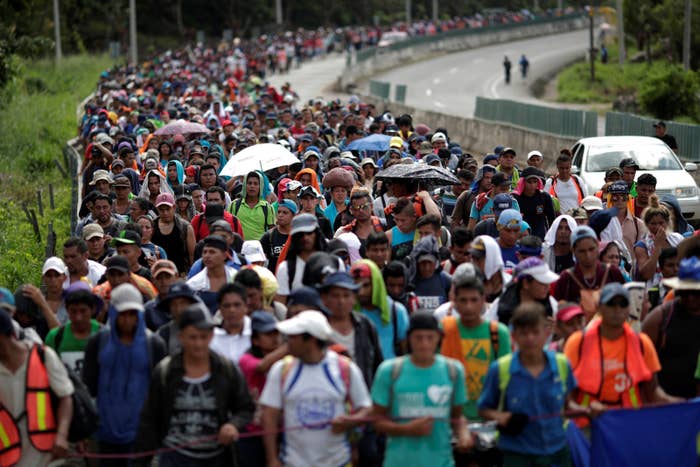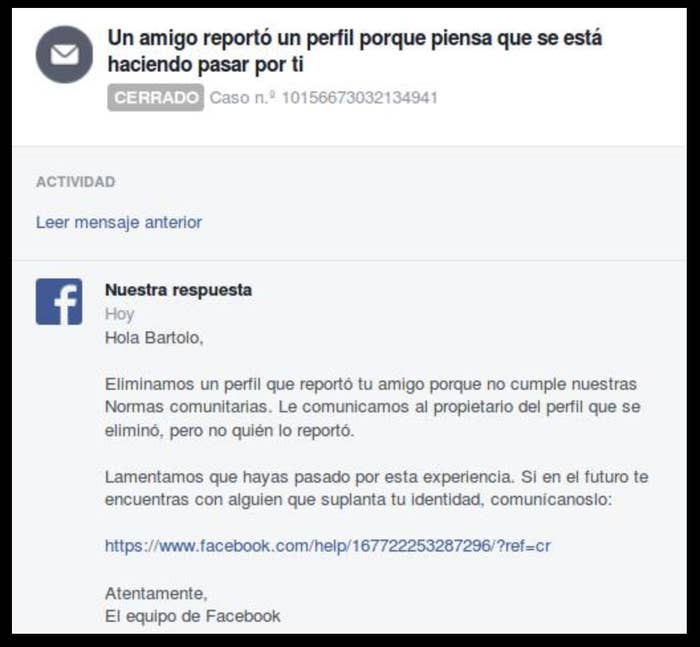
Just days before the migrant caravan set out from Honduras, an imposter stole the identity of a prominent early supporter on Facebook, using a fake account to try to boost the caravan’s numbers.
Bartolo Fuentes, a Honduran activist, journalist, and former lawmaker told BuzzFeed News that someone used the phony account to send Facebook messages falsely claiming that established migrant groups were organizing the effort. News like that — coming from a well-known public figure in Honduras, such as Fuentes — could go a long way to convincing people to join the group of migrants traveling to the US.
The caravan, which threaded north through Guatemala and Mexico, eventually ballooned in size to more than 7,000 people. It also became a political flashpoint in the lead-up to last month’s US midterm elections.
In response to a query from BuzzFeed News, a Facebook spokesperson said the phony account “was removed for violating [the company’s] misrepresentation policy,” but declined to share any further information, such as what country it originated from, what email address was used to open it, or any other details that might reveal who was behind it. Facebook added that, barring a subpoena or request from law enforcement, it does not share such information out of respect for the privacy of its users.
Fuentes said he believes it’s important to find out who was behind the rogue account — but hasn’t gotten any answers from Facebook. “Who knows how many messages could have been sent and who received them?”

The use of an imposter account to bolster the caravan, which has not been previously reported, comes as Facebook faces increasing scrutiny for the pervasive use of its platform to interfere in US politics through false accounts, many of them linked to Russia. Two days before the midterms, the FBI informed Facebook of activity it “believed was linked to foreign entities,” leading the company to remove 36 Facebook accounts and 99 Instagram accounts “that may be engaged in coordinated inauthentic behavior” and operated in English, French, and Russian.
As far as Fuentes can tell, the fake account, which primarily used Facebook Messenger to spread disinformation, was created less than a week before the caravan was scheduled to depart.
On his real account, Fuentes did post a few times about the caravan, which he said he’d heard about in mid-September after being invited to join a small private WhatsApp group of would-be migrants. One of his posts, from Oct. 4, showed a stylized image of a bedraggled migrant and indicated the caravan “spontaneously convened” without any formal organizer.
But the messages being sent by the imposter, which also had Fuentes’s photo, had a very different flavor, the former lawmaker learned. They claimed that the prominent and influential migrant rights organization Pueblo Sin Fronteras was organizing the caravan and would be leading it on the arduous journey.
But the news was fake. Although Pueblo Sin Fronteras had organized several previous caravans, including a big one in the spring that attracted 1,500 people, it staunchly opposed the latest effort based on well-founded fears it would stoke anti-immigrant sentiment ahead of the elections.
The bogus Fuentes account stands out for its sophistication and timing. It was created before the caravan departed, when the event had not yet attracted news coverage. It operated entirely in Spanish and precisely targeted influencers within the migrant rights community. And rather than criticize or undermine the caravan — as other online campaigns would later attempt to do — it was used to legitimize the event, making a loosely structured grassroots event appear to be a well-organized effort by an established migrant group with a proven track record of successfully bringing Central American people to the US border.
Fuentes has been unable to get any information from Facebook about the account, but one small detail stood out. Whoever created it listed the Honduran capital of Tegucigalpa as Fuentes’s hometown, rather than the San Pedro Sula suburb of El Progreso. That might seem like a minor error, but it’s the sort of mistake a foreigner — not a Honduran — would make about the well-known former lawmaker, whose left-wing party stands in opposition to the current president’s administration.
When the imposter account began sowing misinformation, the caravan was not expected to be huge — in fact, very few people even knew about it. Only around 160 men, women, and children showed up at the bus station in San Pedro Sula at the appointed time early Oct. 12.
Fuentes has no idea how many messages were sent by the imposter account, or who might have received them. He said the WhatsApp group where he learned about the caravan had only a few dozen people in it, and he subsequently found out about a few other such groups that were equally small. He was surprised to see people continuing to arrive at the bus station throughout the morning, eventually attracting media coverage.
Fuentes was interviewed on Honduras’s top-rated television news station, HCH, as the crowd gathered. The huge turnout inspired him to join the caravan for at least part of its journey, although he had no plans to immigrate to the US. By the next morning, before the caravan had even departed, the number of migrants had swelled to more than 1,200 — making it among the largest in history.
By the time the caravan’s participants had traveled the nearly 200 miles to cross the Guatemalan border on Oct. 16, so many other migrants had joined that it had grown to some 3,000 people — more than double the size of any previous caravans.
That same day, President Donald Trump issued the first in a series of increasingly incendiary tweets about it, threatening to withhold aid to Honduras if the migrants didn’t turn around.
The United States has strongly informed the President of Honduras that if the large Caravan of people heading to the U.S. is not stopped and brought back to Honduras, no more money or aid will be given to Honduras, effective immediately!
But the caravan continued to grow — reaching an estimated 7,200 migrants as it advanced through southern Mexico. With the midterm elections less than a month away, Trump and other Republicans seized on the issue, calling the caravan an “invasion” and framing it as a crisis that only a Republican victory in the midterms could solve. The president sent thousands of soldiers to the border, and he, along with other politicians and pundits, pointed fingers at “leftist organizations,” Venezuela, gang members, and even George Soros for organizing the caravan.
“The American people, I think, see through this,” Vice President Mike Pence told Fox News on Oct. 27. “They understand this is not a spontaneous caravan of vulnerable people.”
Many of the migrants left the caravan to remain in Mexico, but more than 5,000 reached Tijuana. Now, as many remain huddled at the border with meager supplies and little clarity about whether they’ll be able to enter the United States, it’s impossible to know what role the fake Facebook account may have played in helping to swell numbers.
“It’s important for me to find out who was behind it,” said Fuentes, who was detained and subsequently deported after crossing the Guatemalan border on Oct. 16 — an action he calls illegal.
Fuentes first learned about the phony account from Irineo Mujica, who represents Pueblo Sin Fronteras and has organized previous caravans.
In an interview, Mujica said the group had been against the caravan because of the likelihood it would be used to stir up anti-immigrant sentiment in the lead-up to the midterms.
That’s why he was so infuriated by the Facebook messages claiming he not only supported the caravan but would personally be traveling to Honduras to lead it out of San Pedro Sula. But once the caravan attained critical mass, Pueblo Sin Fronteras decided to show support, albeit from the sidelines.
In southern Mexico, Mujica, who holds dual US and Mexican citizenship, was arrested by Mexican federal police on Oct. 18, while leading a march in support of the migrants. He was subsequently released on bond.
The largest caravan organized by Pueblo Sin Fronteras numbered 1,500 people. To this day, Mujica said he is mystified by how the latest caravan could have grown so large.
“Nobody wanted this to take place so close to the elections,” he added. “Somebody was clearly trying to mislead people to generate more interest in the caravan.”

